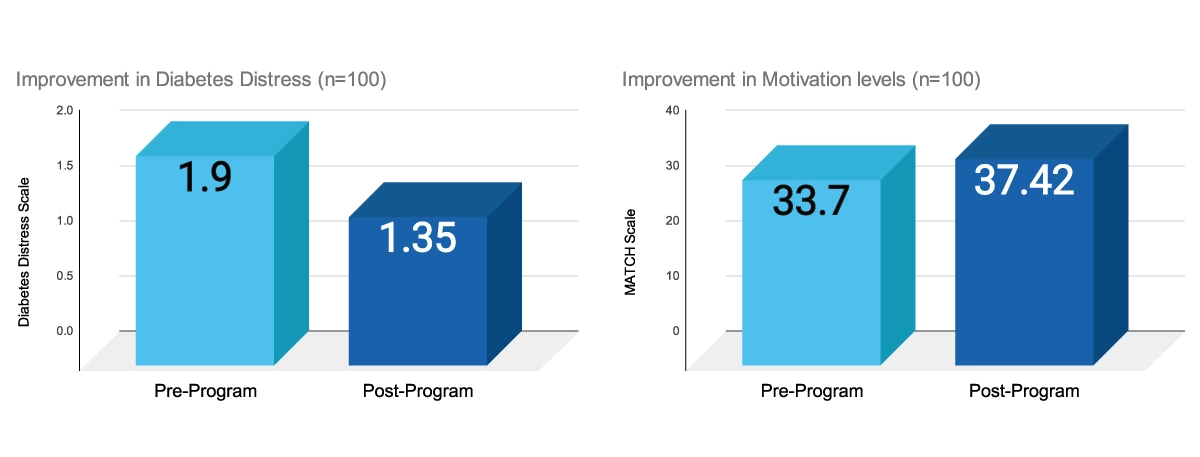Sleep, Diabetes & Mental Wellness: Connecting the Dots

Abstract:
Latest advancements in diabetes management beyond traditional sugar tracking incorporate holistic approaches like sleep tracking and mental health support. This transformation implements technology to improve self-care and the quality of life for diabetes patients. Modern approaches in digital therapeutics, including smartphone apps, AI-driven chatbots, smart gadgets, telemedicine, and online communities, are driving a paradigm shift in diabetes care.
Diabetes Management Beyond Sugar Tracking
In the diabetes management landscape, technological advancements are expanding beyond traditional blood sugar monitoring. This transformation addresses the comprehensive needs of individuals living with this multifaceted metabolic condition. The latest treatment practices now encompass a broader spectrum of health concerns crucial to diabetes management: sleep and mental well-being, beyond merely tracking glucose levels.
By harnessing the power of technology to encompass the broader facets of health, individuals with diabetes can access a holistic approach to self-care. It would enhance patients’ ability to manage diabetes effectively and improve their quality of life.
Sleep Tracking: A Critical Component of Diabetes Care
Sleep tracking among diabetes patients is a critical component of care, as poor sleep quality can disrupt glucose levels and insulin sensitivity. By optimising sleep hygiene through targeted lifestyle changes and interventions, individuals can improve sleep quality and enhance overall diabetes management.
-
Inadequate Sleep and Diabetes Risk
According to a Chinese cohort, individuals sleeping less than 8 hours are at a higher risk of developing T2DM, and a risk score incorporating sleep duration was generated. At the same time, sleep duration of more than 10 hours and prepregnancy obesity increase gestational diabetes risk. So, both too little and excessive sleeping are detrimental to T2DM.
A 2023 study by Columbia University further established that reducing sleep duration by merely 90 minutes for six weeks increased insulin resistance by 15% among women. 38 healthy women, including 11 postmenopausal candidates, enrolled in this study, where researchers regularly monitored participants’ sleep schedules, insulin, glucose, and body fat.
-
Technology Usage for Tracking Sleep
Sleep tracking technology, such as wearable devices or smartphone apps, enables individuals to monitor their sleep patterns and identify issues like sleep apnea, restless leg syndrome, or poor sleep quality. Wearable gadgets include wristbands, armbands, smartwatches, headbands, rings, and sensor clips. They track multiple biosignals, such as heart rate and its variability, skin conductance, temperature, and motion, to infer sleep behaviour.
By understanding sleep patterns among diabetes patients, it is possible to make targeted lifestyle changes to improve sleep hygiene, such as establishing a consistent sleep schedule, creating a calming bedtime routine, and optimising their sleep environment.
Impact of Mental Health Support in Diabetes Care
There is a bidirectional relationship between mental health and diabetes. Anderson et al. reviewed 39 studies with a sample size of 20,218 subjects to put forward that candidates living with diabetes manifest a twofold chance of developing depression than that of the nondiabetic comparison group. Further, diabetic women (28% probability) are more likely to experience depressive symptoms than diabetic men (18% probability). Check out Fitterfly’s blog on the Impact of Mental Health on Diabetes Management to get a comprehensive idea on this topic.
-
Fitterfly’s Study on Mental Health Support in Diabetes Care
Neha Verma et al. conducted a study involving 100 T2DM candidates (enrolled in the 90-day Fitterfly Diabefly DTx Program). It pointed out that customised virtual stress management and behaviour therapy sessions aided in controlling diabetes distress. Participants’ distress reduced by 24.21% from a baseline score of 1.90 to 1.35 (post-program), and their motivation levels improved by 9.39% from a baseline score of 33.70 to 37.42 (post-program).

Figure 1: Graph showing improvement in Diabetes Distress and Motivation level after enrolling in the 90 days Fitterfly Diabefly Program (in a sample size of 100)
-
Role of Technology in Mental Health Support
Technology’s role is pivotal in addressing the mental health challenges T2DM individuals experience. Mobile apps suggest mindfulness meditation and relaxation techniques tailored to the diabetes community. AI-driven chatbots deliver personalised mental health interventions and proactive support based on individual needs and behavioral patterns.
Online support groups and social networks provide opportunities for peer connection, sharing experiences, and receiving encouragement from others facing similar challenges. Telehealth services enable convenient access to mental health professionals for counseling and therapy, addressing issues like diabetes distress, anxiety, and depression.
Future Prospect of Holistic Diabetes Care
Holistic and integrated approaches in diabetes care emphasise a comprehensive view of health, considering not only blood sugar management but also lifestyle, weight management, mental health, and overall well-being.
A Fitterfly study led by Tejal Lathia et al. involving 175 T2DM participants (74 females and 101 males) revealed that tech-driven multidisciplinary care decreased the Diabetes Distress Scale (DDS) score and Pittsburgh Sleep Quality Index (PSQI) by 0.50 and 3.00 points, respectively, from a baseline score of 1.90 and 5.00.

Figure 2: Graph showing improvement in Diabetes Distress, Pittsburgh Sleep Quality Index Score, and Fasting Blood Sugar Level through the DTx Program
Participants’ fasting blood sugar levels decreased by 25.00 from a baseline score of 142.00, overall sleep quality improved by 56%, and sleep duration improved by 59%. This study proved that holistic diabetes management using a multidisciplinary team is the future and offers better outcomes than traditional treatment.
Key Takeaways
- The latest practices in diabetes management expand beyond traditional blood sugar monitoring to provide better holistic outcomes.
- Sleep tracking and mental health care supported by a multidisciplinary team encompass a broader spectrum of health concerns to improve patient’s overall quality of life.
- Technology is pivotal in providing holistic diabetes care through smartphone apps, AI-driven chatbots, smart gadgets, telemedicine, and online communities.
This blog provides general information for educational and informational purposes only and shouldn't be seen as professional advice.
Want to know how can Fitterfly enhance your practice and improve patient outcomes?













